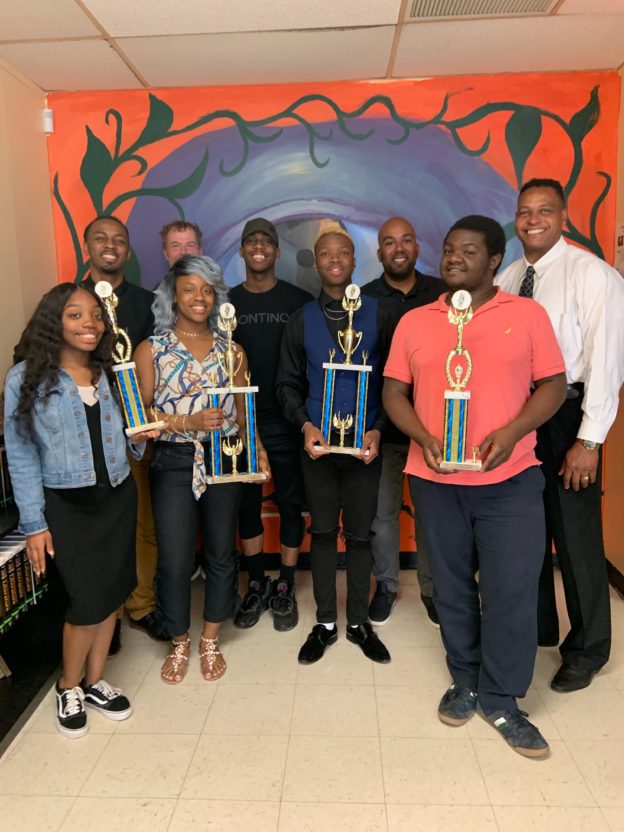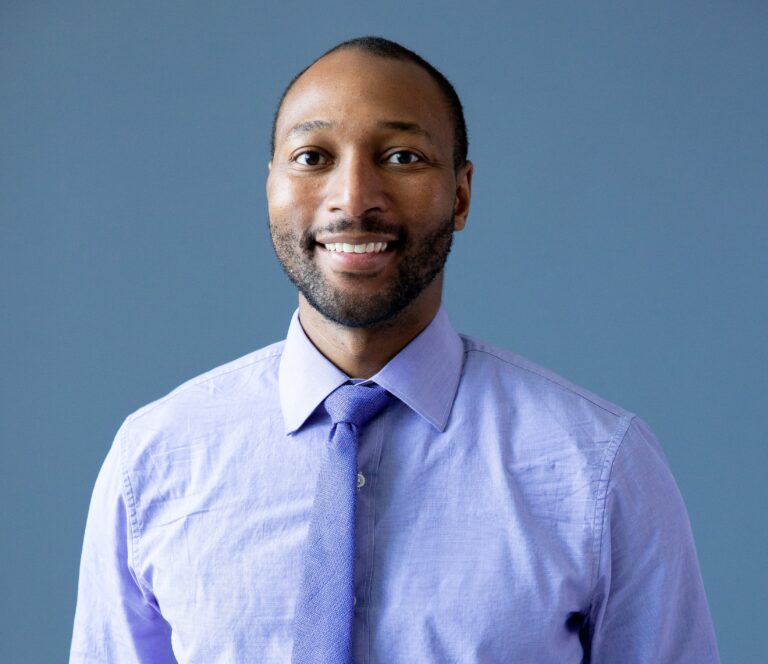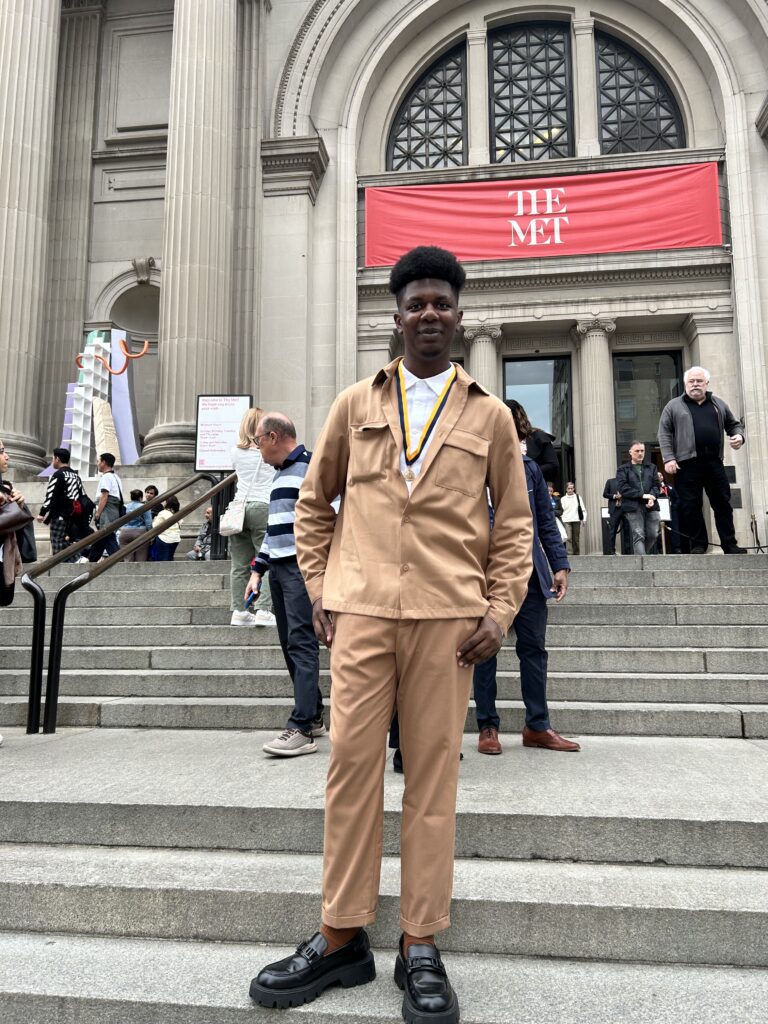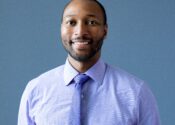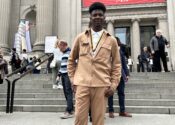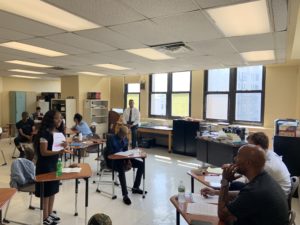 On a seemingly ordinary school day in Brooklyn, a classroom at Aspirations Diploma Plus High School was transformed into a courtroom where the case being debated was the controversial practice of “stop-and-frisk.”
On a seemingly ordinary school day in Brooklyn, a classroom at Aspirations Diploma Plus High School was transformed into a courtroom where the case being debated was the controversial practice of “stop-and-frisk.”
It was the culmination of four months of preparation for participants in Aspirations’ Young Debaters Program, a New York City Department of Education program operated by NYC attorney Richard Celestin, himself a product of NYC public schools, who created the program to introduce debate and public speaking to NYC students, particularly students of color, to grow their interest in pursuing legal careers. The program fosters proficiency in public speaking, evidence-based research, reading, and persuasive writing, and it promotes reasoning as well as communication skills. Students learn essential lawyering tactics, followed by an opportunity to showcase what they’ve learned through a debate competition focusing on a specific area of the law.
When Amanda Etienne, The Child Center of NY’s Vice President of Youth Development, met Celestin and learned of the program, she thought it was a natural fit for Aspirations. Andrew Dillon, The Child Center Program Director at the school, and Youth Advocate Counselor Diamond Roach agreed. “We have a lot of strong-minded individuals that love to advocate for themselves,” noted Roach, “so why not show them the proper way to debate?”
With the strong support of Principal Fleming, Young Debaters at Aspirations was born.
According to Celestin, the students who joined the club did not disappoint. “The students have been engaging and have stepped up to meet the rigor of the program,” Celestin says.
“The meetings were always interesting because the students learned something new every time,” adds Roach. Participants met regularly for four months. Over a plate of pizza, debaters would listen to lessons that varied by session and would then participate in discussions. Students learned to argue their case using legal principles and became increasingly comfortable doing so.
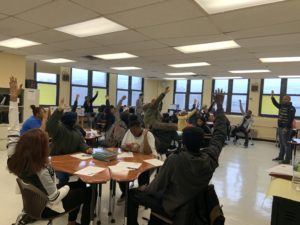 “One student who rarely speaks in class was able to stand up and confidently present an improvised legal argument,” Celestin reports. “Another student has risen to the occasion and has expressed interest in going to law school in the future.”
“One student who rarely speaks in class was able to stand up and confidently present an improvised legal argument,” Celestin reports. “Another student has risen to the occasion and has expressed interest in going to law school in the future.”
In the week leading up to the competition, the students were given a case regarding stop-and-frisk. But instead of being given the choice to represent the side that aligned with their beliefs, they each were assigned a side to debate. This prompted them to step out of their comfort zone and to not only debate, but also create arguments on both sides — and to understand opposing points of view.
On competition day, the students performed above and beyond all expectations. They debated the constitutionality of a stop-and-frisk based on the Fourth Amendment to the Constitution utilizing Terry v. Ohio and related cases. Celestin and Timothy Penney, an English teacher at Aspirations who graciously volunteered the use of his classroom and assistance to run the program, served as judges.
“The students were able to put together thoughtful and persuasive legal arguments in an attempt to convince us of their position,” says Celestin. “The students were able to cite to the legal cases, as well as use real-life relatable examples, with complete fluidity. While the students demonstrated visible nervousness, the sense of accomplishment at the end of the competition, along with the smiles, made the process all worth it.”
Students were scored based on the professionalism of their appearance, organization, execution of their argument, and their answers to questions posed by the judges. All debaters showed knowledge of their sides of the case and used other cases as evidence in their argument.
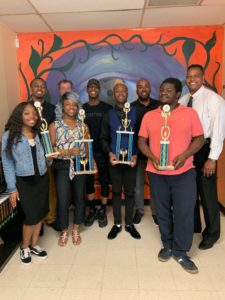 There was a mere one-point difference between the second-place winner, Jeannelys Williams (Respondent), and the third-place winner, Zion Sandy (Respondent). But you could tell that the difference in points didn’t matter, says Roach, because they felt accomplished. “When they were awarded their certificates and trophies, their smiles lit up the room and a sense of appreciation was definitely taken away from the experience.”
There was a mere one-point difference between the second-place winner, Jeannelys Williams (Respondent), and the third-place winner, Zion Sandy (Respondent). But you could tell that the difference in points didn’t matter, says Roach, because they felt accomplished. “When they were awarded their certificates and trophies, their smiles lit up the room and a sense of appreciation was definitely taken away from the experience.”
The first place prize went to Davonne Liaping (Petitioner).
Celestin attributes the success of the program to a combination of an interest in the law and debate, an approach based on authenticity and connection, and the set-up of the program, which is meant to give students a fun and creative way to express themselves.
“Seeing this program in action at Aspirations has been such a rewarding experience,” Celestin says. “The students were given a unique experience and rose to the occasion and made their teachers and school proud.”
Other Child Center programs that offered a Young Debaters club this year include the Beacon afterschool programs at M.S. 72, M.S. 226, Roosevelt Island, and Parsons Community School. The students in these programs were middle schoolers, and they debated on Miranda Rights and the constitutionality of a statement made by an arrested individual without his rights being read. Students utilized legal case law to support their argument, including the seminal Miranda v. Arizona.
All parties involved hope to continue the program next year.
